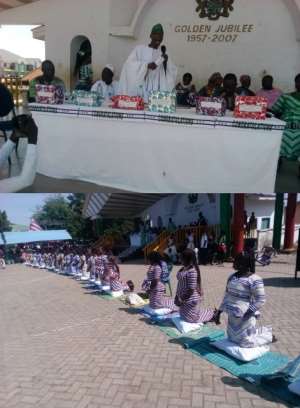
Madam Paulina Patience Abayage, the Upper East Regional Minister, has said investing in the Technical and Vocational sector will improve livelihoods and reduce unemployment rate in the country.
'In today's knowledge driven and competitive global economy, technical and vocational training is a fundamental element in the development equation, because it allows individuals and societies to unlock their potentials, expand their horizons and adapt to changes in the dynamic world.
'It provides a mix of knowledge and career focused education and training that is needed to run the productive sectors of the economy and build the nation.
'It also equips men and women for the job market or self employment, thereby increasing their self reliance and self confidence,' she added.
The Regional Minister said this at the fourth graduation ceremony of the Bolgatanga Sumaasum Weavers Association in Bolgatanga, in a speech read on her behalf by Ms Yvone Wontauh, an Assistant Director at the Regional Coordinating Council.
Citing China, Korea, Malaysia and Japan as examples of countries, which adopted technical and vocational education as economic transformational mechanism, she said the initiative had moved those countries from poverty to economic independence.
She said it was against that background that the government was implementing a five year technical and vocational education and training transformational agenda to equip all the institutions and schools under the National Vocational Technical Institute (NVTI) with the necessary infrastructure and logistics to provide desirable services to trainees.
'The government is also undertaking skills gap analysis in key priority sectors of the economy so that programmes and courses of vocational and technical institutions could be fashioned to be more responsive to the technical and skill needs of the various sectors of the economy.'
Madam Abayage explained that the inception of the Free Senior High School was among other avenues to equip students with the requisite technical and vocational skills, while the One District One Factory would further provide employment opportunities for people with technical and vocational skills.
'Individuals who acquire formal or informal technical and vocational training in electronic repairs, beads making, sewing, hairdressing and textile weaving to mention a few, often set up their own shops and enrol apprentices for training, which reduces the number of active labour force that is idle in the economy,' the Regional Minister added.
Seventy graduates who had successfully passed both the practical evaluations by their respective trainers and written examination conducted by the National Vocation Training Institute were awarded certificates in textiles weaving.
Naba Apasipanga Maaletinga, the Chief of the Kalbeo, who chaired the function, said textile weaving was the culture of the people in the Region, which needed to be preserved and passed onto unborn generations.
The Chief, who is a Smock Weaver, indicated that despite the cultural and economic values that weaving had on the livelihoods of the people, they were challenged with the issues of accessing the raw material as it was expensive.
He called on government to establish a thread factory in the Region that would provide the raw material and enhance production and reduce poverty.
GNA
By Anthony Apubeo, GNA




 Akufo-Addo spotted ordering chiefs to stand for his handshake
Akufo-Addo spotted ordering chiefs to stand for his handshake
 Akufo-Addo ‘disrespects’ every chief in Ghana except Okyenhene — NDC Communicato...
Akufo-Addo ‘disrespects’ every chief in Ghana except Okyenhene — NDC Communicato...
 Supreme Court clears way for dual citizens to hold key public positions
Supreme Court clears way for dual citizens to hold key public positions
 Be transparent, don’t suppress the truth – Prof. Opoku-Agyemang to Jean Mensa
Be transparent, don’t suppress the truth – Prof. Opoku-Agyemang to Jean Mensa
 ‘I won’t tell the world I was only a driver’s mate during challenges’ – Prof Jan...
‘I won’t tell the world I was only a driver’s mate during challenges’ – Prof Jan...
 We’ll prosecute corrupt officials of Akufo-Addo’s govt – Prof Jane Naana
We’ll prosecute corrupt officials of Akufo-Addo’s govt – Prof Jane Naana
 [Full text] Acceptance speech by Prof Jane Naana Opoku-Agyemang as 2024 NDC Runn...
[Full text] Acceptance speech by Prof Jane Naana Opoku-Agyemang as 2024 NDC Runn...
 Election 2024: Don’t be complacent, we haven’t won yet – Asiedu Nketia cautions ...
Election 2024: Don’t be complacent, we haven’t won yet – Asiedu Nketia cautions ...
 Election 2024: Stop fighting over positions in Mahama’s next govt – Asiedu Nketi...
Election 2024: Stop fighting over positions in Mahama’s next govt – Asiedu Nketi...
 Prof Jane Naana Opoku-Agyemang will restore dignity of vice presidency – Fifi Kw...
Prof Jane Naana Opoku-Agyemang will restore dignity of vice presidency – Fifi Kw...
